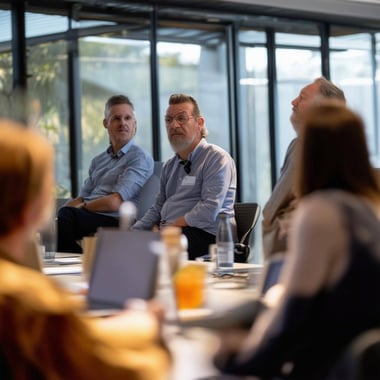
Timely advice for Australia from Operations leaders in USA and UK
By: Jonathan Hall

Six Degrees Executive today connected key manufacturing leaders in Australia with insights from Operations Executives in the USA and UK, where COVID-19 is 2-3 weeks ahead of the situation in Australia.
Speakers from a global manufacturer in the USA and a leading UK food manufacturer shared insights from the changes they’ve seen, processes implemented and key learning over the last 3 weeks.
The USA and UK are further progressed than Australia with COVID-19 in terms of case numbers and restrictions, however governments in each country are mandating different restrictions and centralisation of response, so both leaders shared important and timely insights into what’s been implemented, what has worked and what their learning has been so far.
Responding to immediate challenges
The operations managed in the US includes multiple factories across different states with circa 10,000 employees. In addition to managing the stresses placed on the supply chain, manufacturing, freight and logistics; creating a safe environment for employees and communicating effectively with different stakeholder groups, (internal & external) has been their top priority.
Similar challenges were faced by the UK manufacturer, which employs circa 2,000 employees in a fast-paced, high volume processing environment. Keeping up with immediate volumes amid panic buying has been a concern, although the situation has settled down after around 3 weeks, as some sense of normality has started to return from a retail perspective. Employee safety, maintaining supply and the safety of the community are all at the forefront of the changes being implemented.
The US manufacturer has been proactive in limiting the number of SKUs being manufactured at their plants, to a core range of their top SKU’s. This has improved productivity, reducing production line changeovers, allowing the business to focus on core items they can keep in stock. Despite a reduced workforce and higher than normal absenteeism, productivity has been high, through the focused approach to manufacturing a smaller range of essential items that can be kept in supply for the community. This strategy has gone down well with the retailers who would rather only stock more of the core product range that is selling during the crisis.
Key Advice
The key message from both leaders was, “Don’t wait”. Implementing new safety measures and changes to ways of working might feel extreme at first, but in two weeks’ time, they won’t be.
Some of the changes implemented at the UK operations included phasing start and finish times of shifts, ensuring 2-metre spacing for work stations on the floor and removing canteen furniture to ensure compliance with 2-metre social distancing, staggering lunch breaks, and installing Perspex protective shields to protect and separate workers at each work station. PPE is in short supply in both countries, which is factored into decision making.
The US manufacturer implemented similar changes to ensure safe workspaces both on the floor and with non-essential workers working from home. Employees have been essential in developing changes for their own workspaces. Leaders stressed the importance of communication from the factory floor to the board, including engaging with employees, suppliers, shareholders and Unions to ensure a thoroughly managed change process. The importance of an effective, professional communication strategy for key stakeholders in each stream is even more essential during times of crisis.
Be prepared
With a number of employees from the US manufacturing facilities already testing positive for the virus, the leaders both agreed it’s vital to think about what is likely to happen in the future and the response for different scenarios such as; an employee testing positive, managing the spread in the workplace, and being prepared for workplace fatalities.
The US manufacturer implemented strict testing and isolation strategies, questioning and checking worker’s temperatures on arrival, distancing teams in workspaces, locker rooms and canteen areas, and anti-contamination and deep cleaning of affected areas.
It was important to note that both speakers said that if temperature checking becomes a process, then it’s vital to test the reliability of the technology in advance. Both had experienced initial issues with the data quality from the temperature checks.
With teams often depleted due to illness or self-isolating, over resourcing is key to ensure enough workers is encouraged.
Whilst the UK operations hasn't had any positive cases so far, they have implemented strategies to manage if an employee tests positive and managing isolation for affected co-workers and family members.
For more advice and insights, contact a Six Degrees recruitment specialist in your area.
Related


Stay ahead of the EOY crunch with contracting
Even though December comes around the same time every year, somehow it still manages to hit us with...
.jpg?width=352&name=FMCG%20Sales%20-%20Blog%20(3).jpg)
FMCG Sales: 2025 Trends & Hiring Challenges
In a market defined by consolidation, and caution, FMCG Sales leaders are facing increased pressure...

 Accessibility
Accessibility